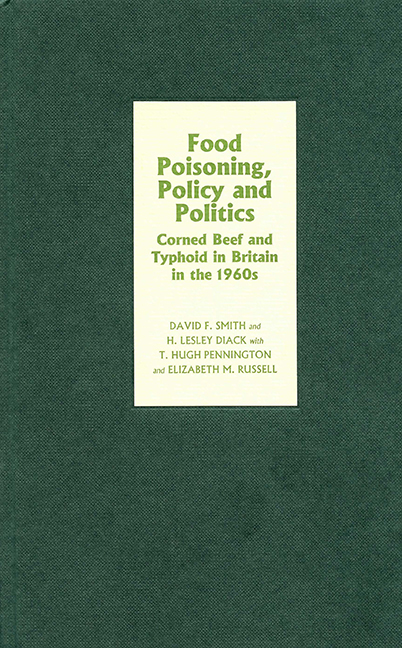Book contents
- Frontmatter
- Contents
- List of illustrations
- Preface and acknowledgements
- Abbreviations used in text
- Abbreviations used in footnotes
- 1 The earlier history of typhoid and food poisoning
- 2 The 1963 corned beef-associated typhoid outbreaks in Harlow, South Shields and Bedford
- 3 The Aberdeen typhoid outbreak
- 4 The medical officer of health, the media and the public in the Aberdeen typhoid outbreak
- 5 Ministers, officials and the Aberdeen typhoid outbreak
- 6 The Milne Committee of Enquiry
- 7 The recommendation on the inspection of overseas meat plants: the roles of existing policy agendas, and interdepartmental and inter-professional tensions
- 8 The disposal of suspect canned meat: the priority of politics over technical advice
- 9 British action to encourage improvements in Argentine meat hygiene, 1964 to 1969
- 10 Summary and conclusions, and food safety since 1964
- Appendix: Recommendations of the Milne Committee
- Bibliography
- Index
Preface and acknowledgements
Published online by Cambridge University Press: 24 October 2017
- Frontmatter
- Contents
- List of illustrations
- Preface and acknowledgements
- Abbreviations used in text
- Abbreviations used in footnotes
- 1 The earlier history of typhoid and food poisoning
- 2 The 1963 corned beef-associated typhoid outbreaks in Harlow, South Shields and Bedford
- 3 The Aberdeen typhoid outbreak
- 4 The medical officer of health, the media and the public in the Aberdeen typhoid outbreak
- 5 Ministers, officials and the Aberdeen typhoid outbreak
- 6 The Milne Committee of Enquiry
- 7 The recommendation on the inspection of overseas meat plants: the roles of existing policy agendas, and interdepartmental and inter-professional tensions
- 8 The disposal of suspect canned meat: the priority of politics over technical advice
- 9 British action to encourage improvements in Argentine meat hygiene, 1964 to 1969
- 10 Summary and conclusions, and food safety since 1964
- Appendix: Recommendations of the Milne Committee
- Bibliography
- Index
Summary
In May 1964 a typhoid outbreak began in Aberdeen, Scotland which, within a few weeks, led to the hospitalisation of over 500 people. A committee of inquiry appointed during the outbreak and which reported in December concluded that the infection had arisen from canned corned beef that had become contaminated by unchlorinated cooling water during the canning process at a factory in Argentina. Three smaller outbreaks in England during 1963 had been explained in the same way. In contrast to the 1963 outbreaks, the Aberdeen outbreak was very well publicised throughout and beyond the UK, in newspapers, and via radio and television news reports. The incident became notorious in the history of food safety and food poisoning, and is remembered vividly by Aberdonians who lived through it.
This book investigates the four corned beef-associated typhoid outbreaks and sets them in the context of the long-term history of typhoid and food poisoning. The policy-making processes surrounding the outbreaks are explored, including the circumstances that allowed the Aberdeen outbreak to happen following the outbreaks in England, the political handling of the Aberdeen outbreak, the shaping of the report of the committee of inquiry, and the implementation of its findings. There are important international dimensions concerning the hygienic control of Argentine meat and meat products, while local dimensions include the role of the health services, especially the medical officer of health, and the experiences of patients and Aberdeen's population. The interactions between and within government departments, such as the Ministry of Agriculture, Fisheries and Food (MAFF), the Ministry of Health and the Scottish Office are analysed, as well as the interactions between the government departments and local actors. In the final chapter, a way of conceptualising the complex processes of food policy making and implementation during the 1960s is presented.
In view of recent widespread interest in food poisoning and food safety, the analysis presented in this book is not merely of historical interest. Recently, however, there have been some profound changes in the food safety regimes in the UK and Europe. The Food Standards Agency (FSA) was created in 1999, and the European Food Safety Authority came into being in 2002.
- Type
- Chapter
- Information
- Food Poisoning, Policy and PoliticsCorned Beef and Typhoid in Britain in the 1960s, pp. vii - xiPublisher: Boydell & BrewerPrint publication year: 2005

